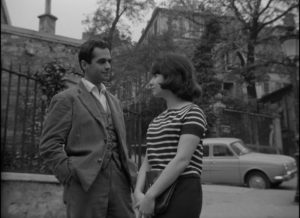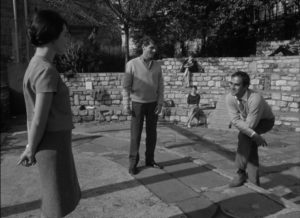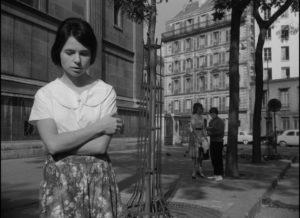 Review: Now Streaming
Review: Now Streaming
Paris Belongs to Us | Jacques Rivette | France | 1961 | 141 minutes
Four Star | Madison Public Library | Hulu
Grant Phipps examines the often overlooked feature debut from Jacques Rivette (L’amour fou, La Belle Noiseuse)
“I speak in riddles but some things can only be told in riddles.” —Philip
If Paris Belongs to Us had been originally released the year after it was filmed in 1959, alongside Truffaut’s 400 Blows or even Breathless in 1960, the grammar and subject matter of the French New Wave may have been more attributed to the erudite conspiracies of Rivette rather than the provocative romances of Godard.
Recently restored by Janus Films and Criterion Collection, Jacques Rivette’s debut feature is an intrepidly enigmatic film historically marred by a prolonged two-year-plus post-production. As it didn’t make it to cinemas until December 1961, its radical anti-narrative may have seemed slightly tame and stale compared to the young impassioned couple at the heart of Breathless or the coming-of-age episodes of Antoine Doinel in 400 Blows.
By comparison, Paris is aloof; Rivette riffs on Kafka’s writings with the young literature student, Anne G. (Betty Schneider), as a stand in for the recurringly befuddled K. For maximum resonance, a bit of Bergman’s psychological penchant for literal theatricality ensures its niche artistic appeal but perhaps one analogous to the seminal album The Velvet Underground and Nico (1967)—both underappreciated for their peculiarities and innovations at the time of release but later lauded for their essential contributions to their respective mediums.
From its credits sequence that peers out a passing train’s window, to the spiraling tilt-to-pan that snakes through Anne’s apartment, and the hysteria of her neighbor’s assertion that Anne’s brother Pierre (François Maistre) has possibly been murdered, Paris Belongs to Us is a nomadic labyrinth that promotes treachery as often as it quashes it.
 In this initial implacable intrigue, Anne is swept up in the affairs of an older group of thespians, which includes Pierre (still living) and her friend Jean-Marc (Jean-Claude Brialy). Led by dapper theatre director Gérard Lenz (Giani Esposito), the troupe harbors a drunk/semi-delusional refugee named Philip Kaufman (Daniel Crohem), who has apparently escaped the witch-hunt of McCarthyism in the States. In mourning their musician friend Juan’s apparent suicide, Philip pitches infectiously sinister notions of a cover-up.
In this initial implacable intrigue, Anne is swept up in the affairs of an older group of thespians, which includes Pierre (still living) and her friend Jean-Marc (Jean-Claude Brialy). Led by dapper theatre director Gérard Lenz (Giani Esposito), the troupe harbors a drunk/semi-delusional refugee named Philip Kaufman (Daniel Crohem), who has apparently escaped the witch-hunt of McCarthyism in the States. In mourning their musician friend Juan’s apparent suicide, Philip pitches infectiously sinister notions of a cover-up.
Reading an excerpt from Shakespeare’s Tempest leads Anne to inquire into Gérard’s ambition to stage the notoriously “unplayable” production of Pericles. The ensuing elliptical nature of events is complemented by the rendering of Gérard and Anne’s mutual attraction, which is, like most relationships in the film, occasionally inscrutable. It’s as if Rivette’s attempt to subvert traditional romance with omens becomes a kind of novel romance in itself.
Gérard’s infatuation with Anne could be related to the fact that other actors have quit his production (including Jean-Marc); or he could be sincerely interested in realizing her inner desire to act. When Gérard pleads with her to accept the part of Marina, Rivette wastes no time superimposing meta-commentaries about performance art and life in the way writer-director Matías Piñeiro (Viola, Princess of France) recently has imitated. Rather than seeing the inherent frustration within the play as an impediment, Gérard mirrors Rivette in enigmatic obsession: “It shows a chaotic but not absurd world rather like our own flying off in all directions, but with a purpose. Only we don’t know what.”
What, indeed. Paris‘ rhythm steadily becomes a maddening contradiction of chaos within ordered, almost strategically empty streets and sets. Unable to shake the disappearances and (coincidental) notions of conspiracy that Philip plants in her mind, Anne distances herself from her studies and the play in pursuit of individuals connected to Juan. Are Philip’s prognostications, of a trapped Gérard meeting a fate similar to Juan, those of a psychotic? Despite the irony in Philip’s wary words, holed up in a padded cell of an apartment, the threat of death can’t be rationally refuted. Anne is met with shoulder-shrugs and half-answers; conjecture is transformed into the spiraling eternal question about the legitimacy of one’s identity.
 Much as it has been documented about millennials’ living in a post-9/11 age, the post-traumatic stress that followed Nazi occupation of Paris yields a cloud of uncertainty here, facilitated and compounded by assertions of Gérard’s partner Terry Yordan (Françoise Prévost) of a fascist organization biding their time to once again seize power.
Much as it has been documented about millennials’ living in a post-9/11 age, the post-traumatic stress that followed Nazi occupation of Paris yields a cloud of uncertainty here, facilitated and compounded by assertions of Gérard’s partner Terry Yordan (Françoise Prévost) of a fascist organization biding their time to once again seize power.
The film’s psychology and pervasive dread wouldn’t be as overwhelmingly effective without the eclectic sound design, including a lively but unorthodox chamber score that occasionally morphs into unnerving choral sounds that define the claustrophobia of Philip’s scenes. Often, compositions by Philippe Arthuys and Ivo Malec feel like more psychedelic takes on some of György Ligeti’s most well-known compositions (“Lux Aeterna”). Complemented by flamenco guitar, Juan’s looming symbol, the sonic diegetic and non-diegetic dimensions of Paris Belongs to Us are as strange as its narrative devices.
In the accompanying Richard Neupert interview on the Criterion disc, the film scholar omits music selection when speaking of sound and post-dub dialogue. This seems especially curious considering Rivette’s first endeavor, the 1956 short film Le Coup du Berger (also included in this new Criterion edition) is unusually fascinated with an avant-garde approach to diegetic music (in the husband’s discordant, staccato piano-playing) than collages of scored sound like Godard utilizes.
Thus, while Rivette’s concepts are irrefutably adventurous, they are inherently moodier and less visually involved than his contemporaries. And, at 141 minutes, Paris Belongs to Us is a demanding cinematic experience. While the duration may require a particular leap of faith for audiences, its lack of a clear-cut third act and resolution to its ongoing inquiries are reminiscent of Antonioni’s L’avventura (1960), a mystery which signified a radical shift in film grammar from one decade to the next. Rivette and Antonioni break the passive gaze and expectation ingrained by Hollywood formula.
Paris is film as utter conundrum, as plainly articulated by Philip, and foreshadowed by French poet/essayist Charles Péguy’s quote that acts as a cryptic, contradictory prelude to its own title: “Paris belongs to nobody.” Instead of wholeheartedly rejecting or embracing the idea, it’s far more interesting for Rivette to explore the maze of social tensions and post-war malaise of twentysomethings through a centrifugal conspiracy plot as its own postmodern kind of theatre.
Thanks ♥